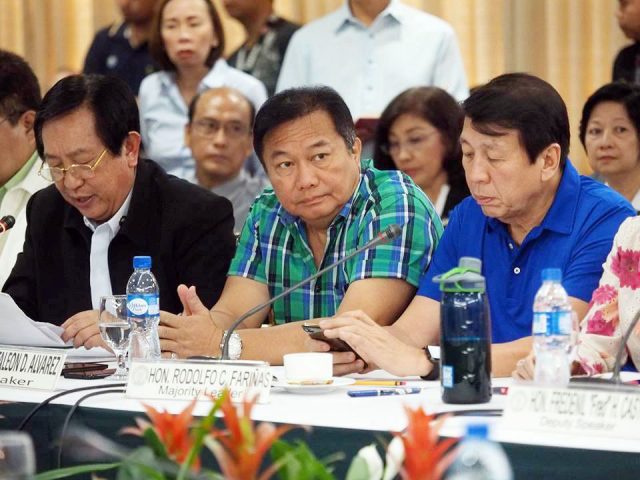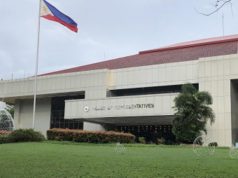
MANILA, Philippines – Toeing the line of Speaker Pantaleon Alvarez, the House of Representatives slashed the budget of the Commission on Human Rights (CHR) to P1,000 in the proposed 2018 appropriations.
By nominal voting, 119 House members approved the motion of 1-Sagip partylist Representative Rodante Marcoleta to give the CHR a measly P1,000 appropriations, while 32 lawmakers objected.
The voting was first done through viva voce, and several lawmakers said the louder vote appeared to be the Nay vote opposing the cut. However, Deputy Speaker Eric Singson, the presiding officer, announced that the Ayes vote had it.
In moving to slash the CHR budget, Marcoleta said the rights body failed to act on violations committed by extremist groups such as the Abu Sayyaf and the Maute group.
Cebu Rep. Raul del Mar, the sponsor of the budget, said the CHR’s functions have been misunderstood.
“We need to be reminded that the CHR’s main function is to curb the excesses and abuses of those in the seat of power,” he said.
Albay Rep. Edcel Lagman added that the CHR has no jurisdiction over the violations of the rebel groups.
“The gentleman (Marcoleta) has failed to distinguish the difference between common crimes and violation of human rights. Not all killings and abductions are considered human rights violations,” he said.
Lagman and Del Mar also pointed out that slashing the budget of the CHR to P1,000, which could immobilize it and virtually abolish it, was unconstitutional.
“The CHR is a creation of the 1987 Constitution. We cannot abolish a constitutional office by legislation,” Lagman said.
Buhay partylist Rep. Lito Atienza said at no other time that the country needs the CHR than now when there are rampant violation of human rights.
“Let is not be said that in the middle of the night, everyone slept. This representation is awake,” he said.
Created under the 1987 Philippine Constitution, the CHR is mandated to conduct investigations on human rights violations against marginalized and vulnerable sectors of the society, involving civil and political rights.
For 2018, it was seeking a budget of P649.48 million (including retirement and pensions), which was P100 million lower than its 2017 budget.
The floor deliberation on its budget was scheduled on Wednesday, September 6, but was deferred because there were no officials in plenary when the agency was called. Gascon explained that there were given a holding room in the other building, far from the plenary hall, and were not immediately informed that their budget was already up for discussion.
On Thursday, September 7, the body was again scheduled for deliberation, but it was not called. It was rescheduled on September 12, the last day of budget deliberation.
During the committee briefing on its budget in August, Speaker Pantaleon Alvarez said he would give the body a zero budget, if the decision were up to him. He chided the body for raising howl on the alleged extra-judicial killings linked to the Duterte administration’s war on drugs, while keeping mum on innocent civilians victimized by the criminals.
Rep. Lagman said the reduction of the P623.3 million budget of the Commission on Human Rights (CHR) to the “minuscule and disgraceful” P1,000 annually is virtually imposing the death penalty on a constitutionally created and mandated independent office.
Emasculating and killing the CHR with an annual budget of P1,000 is unconstitutional because it virtually abolishes a constitutional office by legislative fiat, Lagman added.
“In the midst of unabated extrajudicial killings, torture, enforced disappearances, and other human rights violations, it behooves Congress to ensure that the CHR continue to exercise its constitutionally mandated powers and functions,” he said.
There is a distinction between common crimes and violations of human rights. Not all killings, abductions, and ambushes are considered human rights violations, Lagman pointed out.
Statement of the Commission on Human Rights
The Commission on Human Rights has always taken positions in favor of human rights. It does so without fear or favor, in a non-partisan manner, and as rightfully mandated by the 1987 Constitution. It is regretful that, in the performance of our duties, the House of Representatives opted to undermine our role as a check-and-balance mechanism of the government by allocating PHP 1,000 for our budget.
We regret that despite continued clarifications on our mandate, they have wrongly perceived our role as combative rather than a collaborative effort to bolster Philippine democracy by ensuring that all public officials are honest in the performance of their duties and adhere to universally accepted principles of human rights.
The CHR is a Constitutional office created to serve the people as a State institution—separate and independent from the three principal branches of the government—as watchdog and protector against human rights abuses. We have called out violations and praised positive measures across administrations in promoting the societal goals of justice and rule of law.
Congress has even expanded CHR’s role beyond the Constitution by designating powers and functions in special laws, such as the Magna Carta for Women; the Anti-Torture Law; the Anti-Enforced Disappearance Law; and as Children’s Ombud, among others. It cooperates with different stakeholders and has assisted the Human Rights Offices of the Security Sector, as well as the Presidential Human Rights Committee.
It is unfortunate that the same Lower House of Congress, who was crucial in deliberating these laws, has now chosen to deny the Commission its ability to meaningfully pursue its human rights protection, promotion, and policy-advisory functions through insufficient appropriations.
At the same time, we thank the 32 Representatives, who stood up with us in our fight for this country and human rights during the budget deliberations at the House of Representatives today.
We believe that if there are issues regarding the particular management or performance of the current leadership of the CHR, there are enough mechanisms or platforms upon which we may individually or collectively bring these forward without arbitrarily, whimsically, or capriciously exercising powers over the purse strings.
Despite these circumstances, we will not turn our backs on our Constitutional duty to render justice for all and give everyone their due. The concern for human rights is beyond partisanship or disagreement. We shall seek means to move forward and navigate through the hurdles mindful of our oath to serve the people and the Republic—because it is what is right and what is needed of the times.









